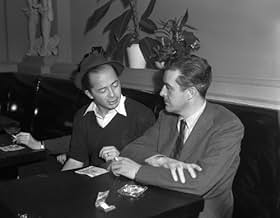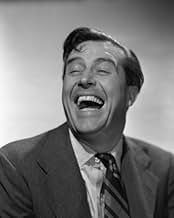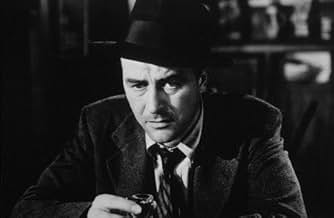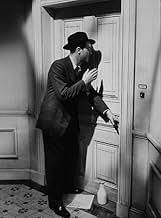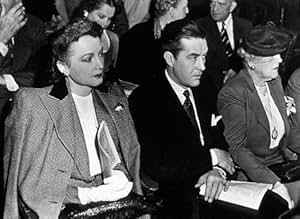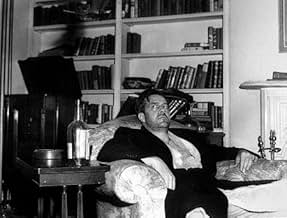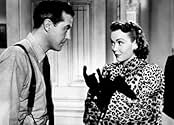NOTE IMDb
7,9/10
42 k
MA NOTE
La vie désespérée d'un alcoolique chronique au cours d'une beuverie de quatre jours.La vie désespérée d'un alcoolique chronique au cours d'une beuverie de quatre jours.La vie désespérée d'un alcoolique chronique au cours d'une beuverie de quatre jours.
- Réalisation
- Scénario
- Casting principal
- Récompensé par 4 Oscars
- 18 victoires et 3 nominations au total
Anita Sharp-Bolster
- Mrs. Foley
- (as Anita Bolster)
Andy Andrews
- Alcoholic
- (non crédité)
Gene Ashley
- Male Nurse
- (non crédité)
Walter Baldwin
- Man from Albany
- (non crédité)
Harry Barris
- Pianist at Harry & Joe's
- (non crédité)
Ian Begg
- Undetermined Secondary Role
- (non crédité)
Eddie Borden
- Drunk in Alcoholic Ward
- (non crédité)
Jess Lee Brooks
- Hospital Patient
- (non crédité)
Résumé
Reviewers say 'The Lost Weekend' is a groundbreaking film with a realistic portrayal of alcoholism. Ray Milland's performance as Don Birnam is praised for its depth. Billy Wilder's direction and the film's visual style, including deep focus and Miklós Rózsa's haunting score, effectively convey addiction's despair. However, some find it melodramatic and repetitive, with an unrealistic ending. Despite criticisms, it is regarded as powerful and influential in cinema.
Avis à la une
10Don-102
From the first shot of a bottle hanging from a drunk's apartment, we realize we are about to see a clever addict and a weekend of his demented exploits. Ray Milland has an honest face, not unlike Jimmy Stewart's, however, with this character it is only skin-deep. The great thing about his performance and the film as a whole, is that his face will gradually change, becoming dark and chilly, just like Stewart's in IT'S A WONDERFUL LIFE. Stewart had lost his life momentarily. Milland has lost his soul to the bottle and he will stop at nothing to quench his thirst.
This really is a textbook example of the alcoholic's lies and schemes, a precursor to LEAVING LAS VEGAS, although there are people in this film who care about the drinker from the beginning. He just can't stop and we start to lose whatever sympathy we had for him because of how he treats other people. This is a drunk with a sober man wanting to come out, but Wilder's script dives deeply into the unpredictable outcomes of most alcoholics.
LOST WEEKEND was innovative and was almost never released because test audiences could not take the film's realism. The hospital sequence retains its horror, and Milland's withdrawal-induced hallucination of a rat in the wall was like him looking in the mirror. See this movie and you will come away with a completely informed and scary anthology of the antics of a hopeless alcoholic. This is amazing considering it came out of the old Hollywood system.
This really is a textbook example of the alcoholic's lies and schemes, a precursor to LEAVING LAS VEGAS, although there are people in this film who care about the drinker from the beginning. He just can't stop and we start to lose whatever sympathy we had for him because of how he treats other people. This is a drunk with a sober man wanting to come out, but Wilder's script dives deeply into the unpredictable outcomes of most alcoholics.
LOST WEEKEND was innovative and was almost never released because test audiences could not take the film's realism. The hospital sequence retains its horror, and Milland's withdrawal-induced hallucination of a rat in the wall was like him looking in the mirror. See this movie and you will come away with a completely informed and scary anthology of the antics of a hopeless alcoholic. This is amazing considering it came out of the old Hollywood system.
In 1968, I was just 22 years old and driving a taxi part-time in Ft. Lee, New Jersey. One day, I drove Charles Jackson (author of "The Lost Weekend") from Englewood Cliffs, NJ to a run-down hotel in Times Square, New York City. I had seen and really liked the movie of the same name, starring Ray Milland, who did a wonderful job portraying an alcoholic on a weekend binge. The film was so realistic, I had a strong feeling that Charles Jackson had written the book based on his own life. I got up the nerve to ask him, and he told me that....yes, he indeed was the alcoholic portrayed in his book. We talked quite a bit about his life on the way into Times Square. He seemed like a very nice person, although he seemed quite depressed. However, it still came as quite a shock when, shortly after having him in my cab, I read in the papers that he had hung himself in his hotel room in NYC. That's an experience I will never forget!
Seedy bars, pawnshops, and an array of elaborate hiding places are the overriding images from this film. The Lost Weekend is a grimly realistic account of four days in the life of a chronic alcoholic, played by Ray Milland. In films of this quality one always takes away unforgettable images. The most striking is Milland's drunken efforts to remember where in his apartment the last hiding place he used is. Degraded and thoroughly beaten by his addiction, his last refuge is to try and keep it a secret from those who still love him. Billy Wilder's direction and script is brilliant - sympathetic, but unpatronising in his handling of a delicate and rarely dealt with affliction. Not until Nicolas Cage's portrayal of a man determined to drink himself to death in Leaving Las Vegas, has alcoholism been dealt with so well. Milland's performance is first rate - no hammy shlurring of words - and the atmosphere is dark and seedy like the bars he frequents. The scene where he spends several hours trying to find an open pawnshop on a public holiday is both harrowing and dazzling - it is remeniscent of the filmic image of a parched man trying to cross the desert.
Uncompromising, dark and definitely disturbing Best Picture Oscar winner from 1945 that deals with a writer's (Ray Milland in one of the very best performances ever shown on the silver which deservedly landed him his only Oscar) alcoholism and the effects that his problem has on himself, his work and those closest to him. The love of his life (Jane Wyman) and his very supportive brother (Phillip Terry) try to save Milland from a habit that has gotten terribly out-of-hand. Heart-wrenching flashbacks into Milland's demise are sometimes difficult sequences to get through. In the end it is not a sure thing if Milland can distance himself from his disease and return to a normal life. Billy Wilder's uncompromising direction and screenplay yielded him Oscars in this film that scared many studios away in the early-1940s due to its intense subject matter and the question of whether the film could create interest. Made during a time when patriotic movies and romantic comedic farces dominated the cinema, "The Lost Weekend" was truly unlike anything ever experienced before. A very well-made production that is first class all the way. A real classic in every sense of the term. 5 stars out of 5.
10jotix100
The American cinema can count itself lucky with the wave of arrival of the best European talent in the days prior to World War II. Among the most distinguished directors that came to Hollywood was Billy Wilder who left a legacy, not only as a director, but in the many screen plays he wrote. One of his great works was "The Lost Week-end". Written with Charles Brackett, one of his most frequent collaborators, this is a film that dared to talk about a thing that no one dared to speak before: alcoholism.
If you haven't seen the film, please stop reading now.
On the opening scene of the picture we watch Don Birman, and his brother Wick packing suitcases for a long weekend in the country. We realize not everything is all right as we watch a bottle tied with a piece of string hanging out of a window. It's clear to see what was wrong with that picture, Don is an alcoholic! Wick, having enough common sense, wants to keep his brother near him, in order to control the situation.
Things get complicated with the arrival of Helen, the woman in love with Don. Helen St. James has been in a relationship with Don that has gone nowhere because of his drinking problem. Helen, as well as Wick, don't have the courage to have him committed to have him cured of his addiction. In fact, both are to blame about the condition affecting Don, but neither realize how deep is the problem.
In 1945 themes involving addiction were never told to the movie going public. Alcoholism was a vice that affected a lot of people in the country, but those were the days where people with drinking problems stayed in the closet, not daring to recognize how their lives were being ruined by the heavy use of alcohol.
We watch in horror as Don spends a weekend in hell going from one scheme to the next trying to get money to support his nasty habit. We also see Don Birman experience the worst night of his life when he is taken to a hospital, after falling down from a staircase. There, he sees first hand the horrors his addictions will bring to him. In a way, the exposure to the men in the hospital is a wake up call for Don, who decides to end it all because drinking has taken over his life. The movie should be seen by anyone suffering from this terrible social disease.
Ray Milland transforms himself into this troubled man. He gives an incredible performance. Mr. Milland has to be given credit in undertaking the portrayal of this lost soul in such a convincing fashion. By Hollywood standards, Ray Milland, an actor better known for his work in comedies, transforms himself into this Don Birman.
The supporting cast was excellent as well. Jane Wyman as Helen St. James is seen in one of her better roles of her career. Phillip Terry, as Wick, the kind brother is also good. Howard DaSilva, the bartender Nat, makes an impressive appearance in the film. Doris Dowling, as Gloria the friendly prostitute is equally effective.
Of course, this is a movie that shows Billy Wilder at his best. By filming on location in Manhattan, a rich texture is added. From Nat's bar we can watch the trams that circulated on Third Ave. at that time, as well as the 3rd. Av. El. The excellent black and white cinematography of John Seitz looks as good today, as it must have looked in 1945, when the film was released. The music score by the great Milos Rozsa is haunting without being too obvious.
This is, without a doubt, one of Billy Wilder's best movies, one that endures the passing of time. Mr. Wilder dared to speak out loud about something no one wanted to talk about.
If you haven't seen the film, please stop reading now.
On the opening scene of the picture we watch Don Birman, and his brother Wick packing suitcases for a long weekend in the country. We realize not everything is all right as we watch a bottle tied with a piece of string hanging out of a window. It's clear to see what was wrong with that picture, Don is an alcoholic! Wick, having enough common sense, wants to keep his brother near him, in order to control the situation.
Things get complicated with the arrival of Helen, the woman in love with Don. Helen St. James has been in a relationship with Don that has gone nowhere because of his drinking problem. Helen, as well as Wick, don't have the courage to have him committed to have him cured of his addiction. In fact, both are to blame about the condition affecting Don, but neither realize how deep is the problem.
In 1945 themes involving addiction were never told to the movie going public. Alcoholism was a vice that affected a lot of people in the country, but those were the days where people with drinking problems stayed in the closet, not daring to recognize how their lives were being ruined by the heavy use of alcohol.
We watch in horror as Don spends a weekend in hell going from one scheme to the next trying to get money to support his nasty habit. We also see Don Birman experience the worst night of his life when he is taken to a hospital, after falling down from a staircase. There, he sees first hand the horrors his addictions will bring to him. In a way, the exposure to the men in the hospital is a wake up call for Don, who decides to end it all because drinking has taken over his life. The movie should be seen by anyone suffering from this terrible social disease.
Ray Milland transforms himself into this troubled man. He gives an incredible performance. Mr. Milland has to be given credit in undertaking the portrayal of this lost soul in such a convincing fashion. By Hollywood standards, Ray Milland, an actor better known for his work in comedies, transforms himself into this Don Birman.
The supporting cast was excellent as well. Jane Wyman as Helen St. James is seen in one of her better roles of her career. Phillip Terry, as Wick, the kind brother is also good. Howard DaSilva, the bartender Nat, makes an impressive appearance in the film. Doris Dowling, as Gloria the friendly prostitute is equally effective.
Of course, this is a movie that shows Billy Wilder at his best. By filming on location in Manhattan, a rich texture is added. From Nat's bar we can watch the trams that circulated on Third Ave. at that time, as well as the 3rd. Av. El. The excellent black and white cinematography of John Seitz looks as good today, as it must have looked in 1945, when the film was released. The music score by the great Milos Rozsa is haunting without being too obvious.
This is, without a doubt, one of Billy Wilder's best movies, one that endures the passing of time. Mr. Wilder dared to speak out loud about something no one wanted to talk about.
Oscars Best Picture Winners, Ranked
Oscars Best Picture Winners, Ranked
See the complete list of Oscars Best Picture winners, ranked by IMDb ratings.
Le saviez-vous
- AnecdotesBilly Wilder claimed the liquor industry offered Paramount Pictures $5 million not to release the film; he also suggested that he would have accepted had they offered it to him personally.
- GaffesWhen the waiter gives Don the check at Harry & Joe's and he reaches for it, the glass, ashtray, napkin, and cigarette all change position between camera shots.
- Citations
[Nat moves to wipe away the circle of whisky from Don Birnam's glass]
Don Birnam: Don't wipe it away, Nat. Let me have my little vicious circle. You know, the circle is the perfect geometric figure. No end, no beginning.
- ConnexionsEdited into Les cadavres ne portent pas de costard (1982)
- Bandes originalesLa Traviata
(1853) (uncredited)
Music by Giuseppe Verdi
Libretto by Francesco Maria Piave
Libiamo ne' lieti calici (Drinking Song) Performed by John Garris and Theodora Lynch with The San Francisco Opera Company
Meilleurs choix
Connectez-vous pour évaluer et suivre la liste de favoris afin de recevoir des recommandations personnalisées
Détails
- Date de sortie
- Pays d’origine
- Langue
- Aussi connu sous le nom de
- Días sin huella
- Lieux de tournage
- Société de production
- Voir plus de crédits d'entreprise sur IMDbPro
Box-office
- Budget
- 1 250 000 $US (estimé)
- Montant brut mondial
- 813 $US
- Durée1 heure 41 minutes
- Couleur
- Rapport de forme
- 1.37 : 1
Contribuer à cette page
Suggérer une modification ou ajouter du contenu manquant



